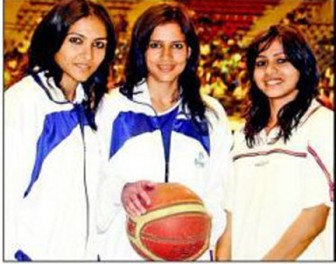NEW DELHI, (Reuters) – Every time she leaps to shoot, 21-year-old basketball player Pratima Singh considers herself lucky that all she has to defy is gravity.
For her four elder sisters, two of them former national captains and another India’s offensive lynchpin, a stronger drag was the country’s notorious gender bias.
A recent Thomson Reuters Foundation poll ranks India as the fourth most dangerous country for women, primarily due to the high female foeticide and infanticide rates in the world’s second most populous country.
According to U.N. Population Fund, up to 50 million girls are missing in India over the past century due to female infanticide and foeticide .

Eyebrows were naturally raised when Priyanka, eldest of the five Singh sisters from India’s holy city of Varanasi, sought to make basketball her career, thus blazing a trail for sisters Divya, Prashanti, Akanksha and Pratima, all of whom shared her healthy distaste for the stereotype.
“I in fact had a fight with an aged relative in our ancestral village near Varanasi,” Divya, who captained the Indian women’s team in the 2006 Commonwealth Games, told Reuters.
“She was sympathising with my father for being ‘burdened’ with five daughters. I told her ‘That’s none of your business and don’t worry, you won’t have to feed us.’
“She was completely dumbstruck,” giggled the former shooting guard, who is now coaching having completed a sports management course in the United States.
GIGGLING SISTERS
Even her father, a banker, would have preferred the sisters to go into civil service, said Divya.
“Whenever we are at home, he still keeps asking ‘why don’t you give it a try?’. But deep inside, I know he has given up,” she said before throwing her head back and joining her giggling sisters.
Youngest sister Pratima, an India forward recovering from a knee injury, said things became easier by the time she stepped on to the court.
“Priyanka faced more resistance than any of us,” Pratima told of her sister now settled in Bangkok.
“By the time I decided to pursue basketball, everyone had accepted it. I’m fortunate that I did not have to experience what Priyanka and Divya went through,” the 5’8” forward said, running fingers through her hair.
“But it has not been altogether a smooth journey for me either. My college teachers still have a problem with it and they don’t miss a chance to remind me how many classes I have missed due to my basketball commitments.”
Prashanti, 26, put it down to the conservative mentality that moulds the outlook towards working women in most of India’s smaller towns and villages.
“When Priyanka and Divya started playing basketball, it was a new thing there and people are always apprehensive about anything novel,” said the 5’8” shooting guard who captained India from 2009-2010.
Prashanti explained how it was hurting India.
MALE BASTION
“There was a girl of my batch in school. She was an amazing athlete, so athletic and gifted. She was very agile and the fastest among us.
“But she never got the support of her family. She was forced to quit the game. I heard she has settled down and is now just another housewife, which I think is a pity.”
Divya stormed another male bastion when she took over the reins of the Indian youth team and is relishing the challenge of coaching boys.
“It’s a not a big deal coaching boys,” she said at the capital’s Indira Gandhi indoor stadium, named after India’s lone woman prime minister whose hectored male colleagues reportedly accepted her as the only ‘man’ in her cabinet.
“The boys respect me for having captained India and the eight years I represented the country,” said Divya.
“It’s a mixed bag, some pay more attention than others and some need that extra goading. Overall, they don’t have issues with a female coach and I’m enjoying it.”
No mean achievement for a girl in a country where large numbers of parents still yearn for a baby boy.
The country’s top shuttler Saina Nehwal last year revealed having undergone the same experience in the patriarchal north Indian state of Haryana.
The 2010 Commonwealth Games gold medallist wrote in a column how her birth caused a great deal of disappointment to her grandmother, who refused to see the baby until a month after her birth.
While Saina went on to become world number two last year, the Singh sisters made their own mark in Indian basketball.
All but Priyanka, who represented Uttar Pradesh, featured in the Delhi state teams in the 2006 and 2007 national championships.
“It was even more fun in the 2007 Asian Basketball Championship in South Korea where three of us — me, Divya and Akanksha — played together,” said Prashanti.
The Singh sisters want to make a mark outside the court as well and Akanksha, 23, organised a basketball league in Delhi University to draw more youth to the game.
“It was an amazing experience. I’d be flooded with calls and texts from students curious to know when and where the next match was. Basketball definitely has a market in India,” said the point guard, whose jersey bears her nickname “Bachchi” which is Hindi for “baby girl”.
“Akanksha was always a cute and chubby girl. So people started calling her “Bachchi” and it stuck,” said Prashanti, flashing a mischievous smile.
“Prashanti was nicknamed ‘Boskey’ because my father was fond of some Russian writer whose surname sounded like this,” Divya added.
Their success story has interested Bollywood producers for a film tentatively titled “4 p.m. On the Court” which seemed to have run into some problems.
“I’m not sure what happened. Some contracts were signed but then things got delayed. But it’s still pretty much on track,” said Divya.




